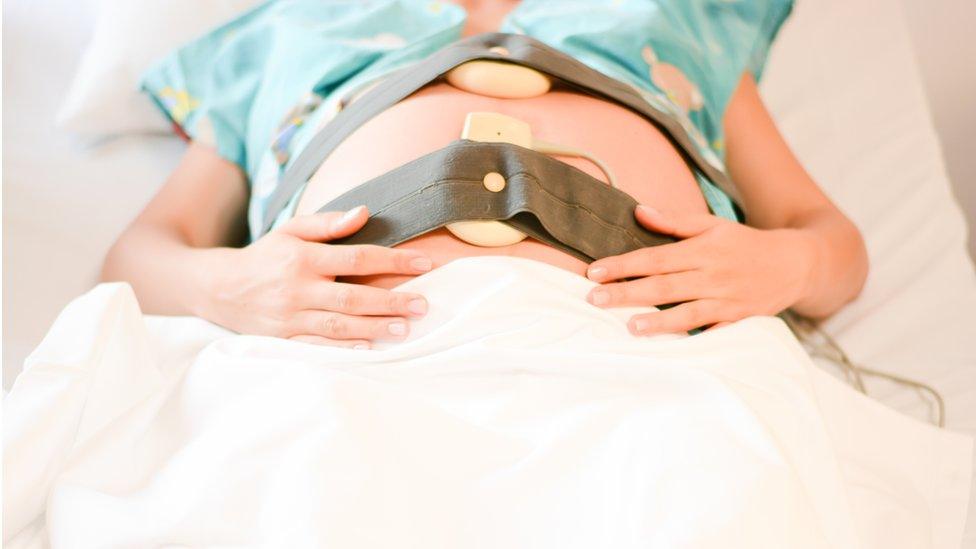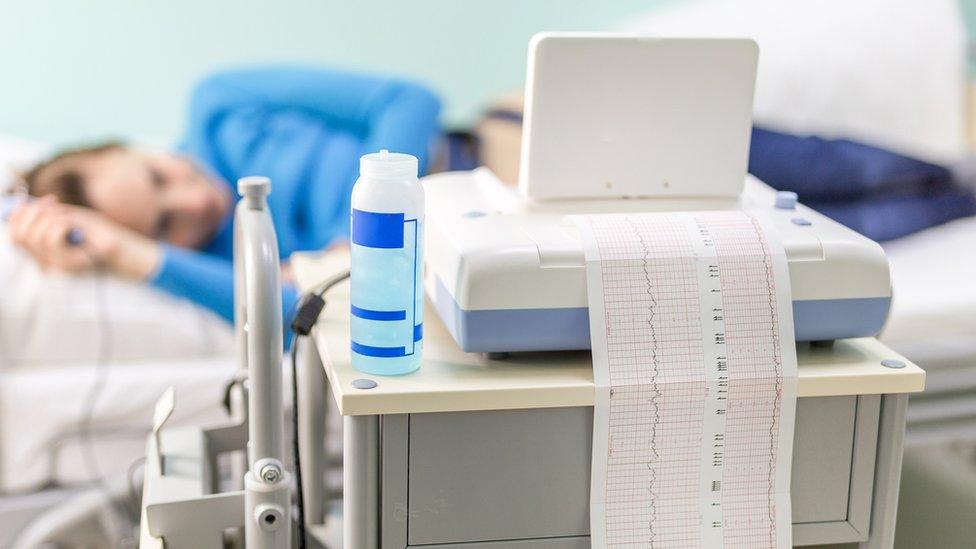Improve fetal heart monitoring, NHS report says
- Published

Research into the best way to monitor the heart rates of unborn babies is urgently needed, says an NHS report that records babies born with avoidable brain injuries in England.
It says all affected families should be offered an apology and an open conversation about their care.
The NHS Resolution report, external looked at 96 serious cases out of 197 investigated for liability.
It wants to find out how future incidents can be prevented.
The report looked at cases of babies born with a potentially severe brain injury following labour, at term, which were reported to the NHS body under a new Early Notification scheme.
The scheme has been running since April 2017 and covers all 129 acute maternity trusts in England.
It is part of a government plan to halve rates of stillbirths, neonatal/maternal deaths and brain injuries linked with birth by 2025.
What does the scheme do?
Its aim is to give families quick answers to questions around what may have gone wrong with the care they received, provide support and, if appropriate, award compensation without delay.
The scheme aims to improve the safety of maternity care by finding out why the incidents occurred and how they can be prevented in the future.
To date, 24 families have received admissions of liability, a formal apology and, in some cases, financial support with care needs within 18 months of the incident, the report says.
Before the scheme was set up, families waited an average of 11.5 years for compensation after an incident.
How many families are affected?
In the first year of the scheme, more than 800 incidents were reported and most involved newborn babies having their body temperature cooled - known as active therapeutic cooling - soon after birth to reduce the impact of injury to their brains.
Of those, 197 were deemed serious enough to be investigated by panel solicitors to assess liability.
The report looked at 96 of those high-risk cases in detail.
There were 639,984 births in England between April 2017 and the end of March 2018 - and 0.12% were reported to the scheme.

What did the report find?
It found problems with checking fetal heart rates during labour was a factor in 70% of cases and delays in giving birth in 60%.
These included delays in:
transferring to a labour ward
admission to theatre, delays
pain relief
around vaginal breech births
It also reported limited support to staff and families not being involved sufficiently.
And the report found evidence of difficult deliveries of babies' heads during Caesarean section in some cases.
What recommendations does the report make?
It makes six recommendations:
urgent research to develop a standardised approach to monitoring fetal heart rates
open conversations with families about their care and the investigation process
support, including psychological assessment, for NHS staff
raised awareness of the difficulties of delivering the fetal head during Caesarean sections - and effective training
improved detection of hyponatraemia in women in labour
increased awareness of the importance of the resuscitation and immediate neonatal care for newborn babies
What do experts say?
Prof Lesley Regan, president of the Royal College of Obstetricians and Gynaecologists, said: "Every incident of avoidable harm is a tragedy for the family and distressing for the maternity staff involved.
"Alongside the need to provide families with prompt interventions and more post-incident support for staff, this report has highlighted the need to develop more clinical interventions to prevent these incidents from happening in the first place.
"The RCOG is committed to working closely with the NHS, Royal College of Midwives and other partners to provide further national guidance and training for maternity teams to reduce the risk of avoidable harm."
Gill Walton, chief executive of the Royal College of Midwives, said the UK was a safe place to give birth "for the vast majority of women and their babies".
"However, despite the fall in stillbirth and neonatal mortality, avoidable incidents do happen," she said.
"We want women and their babies to receive the safest possible maternity care, so it's vital we enable learning for improvements to safety and to reduce avoidable deaths."